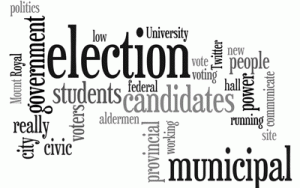Civic election should fascinate students
by Zoey Duncan
Municipal politics may not strike most Calgarians as riveting or glamorous, but the approach of the 2010 civic election is already highly anticipated by some.
Participation in the municipal election is generally low. The 2007 election brought out one-third of eligible voters, an increase over the dismal 2004 election when barely one-fifth bothered.
The apathy is paradoxical, said Mount Royal University business professor and civic engagement advocate Naheed Nenshi, because municipal maneuvering affects individuals more directly than national or provincial decisions.
“The municipal system…is actually really, really important to students though students never think of it that way,” Nenshi said.
If the federal government were to stop functioning, Nenshi said it would be a week before anybody noticed. If the provincial government ceased operations, we’d notice within a few days. But if the municipal government shut down, the impact would be immediate, he said, because it is responsible for such essential services.
Aldermen, candidates and citizen advocacy groups are all making efforts to engage a younger audience through social media.
“[They want to] communicate with students where they live, you know, on their phones,” Nenshi said.
Twitter is proving to be a popular forum for local political discussion. The Calgary Herald is keeping track of all candidates using a Twitter list at Twitter.com/CalgaryHerald/RaceforCityHall, and city council-related tweets are all labelled with “#yyccc.”
Grant Neufeld is building a resource site for the election. His site, CalgaryDemocracy.ca, is an attempt to equalize candidates’ abilities to communicate to the public.
“[The goal is] getting people more engaged in the election process whether it’s through voting or running as candidates or working on campaigns,” Neufeld said. Along with a small team of contributors, Neufeld is working on videos featuring candidates’ answers to three questions: why are you running, what do you consider to be key issues and why should we vote for you?
Neufeld said that if enough voters had gotten together in the last civic election, they could have “owned city hall.”
“It’s to the advantage of those in power to have people not voting,” Neufeld said. “It means that they are far more likely to hold on to power.”


